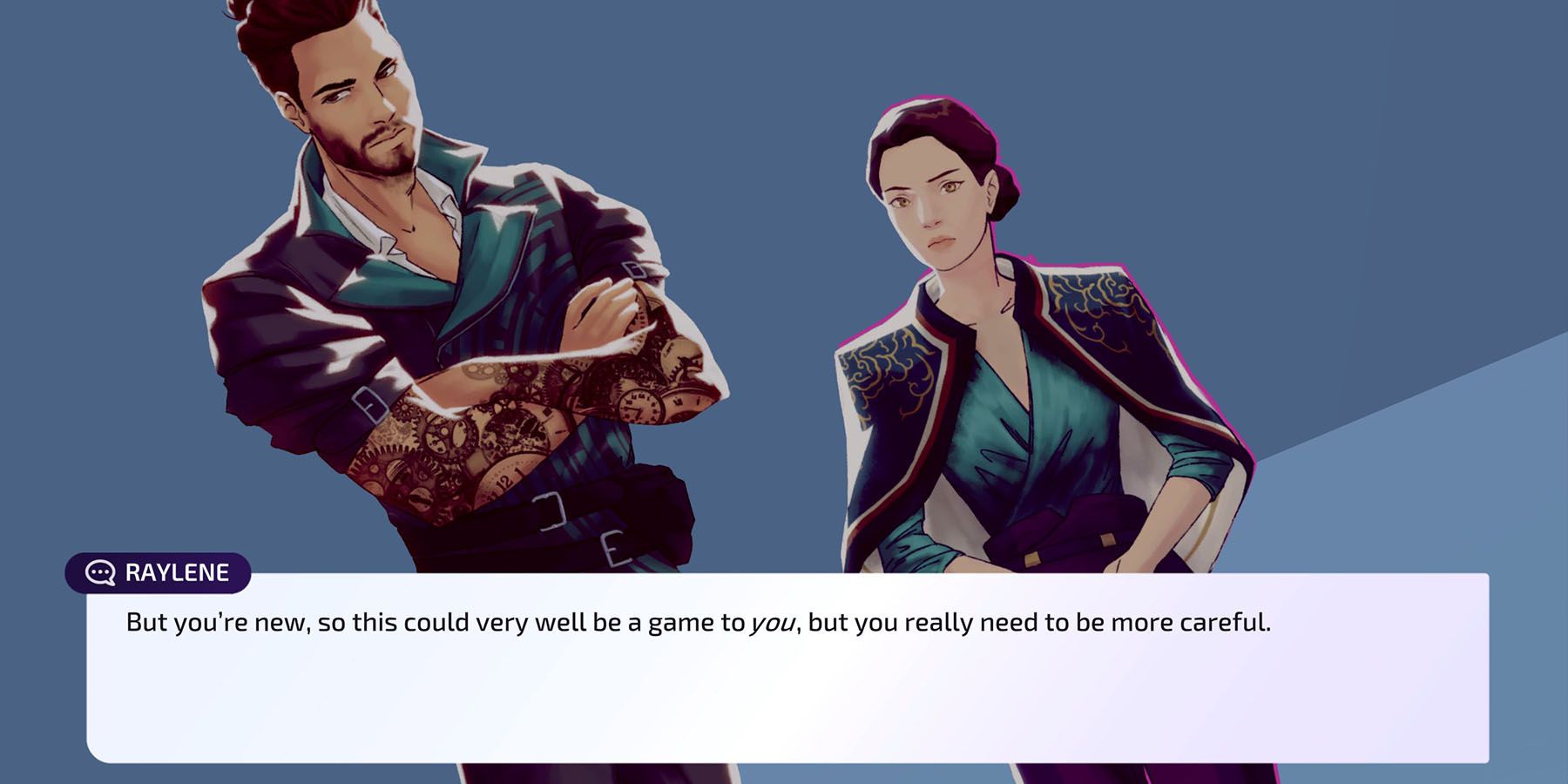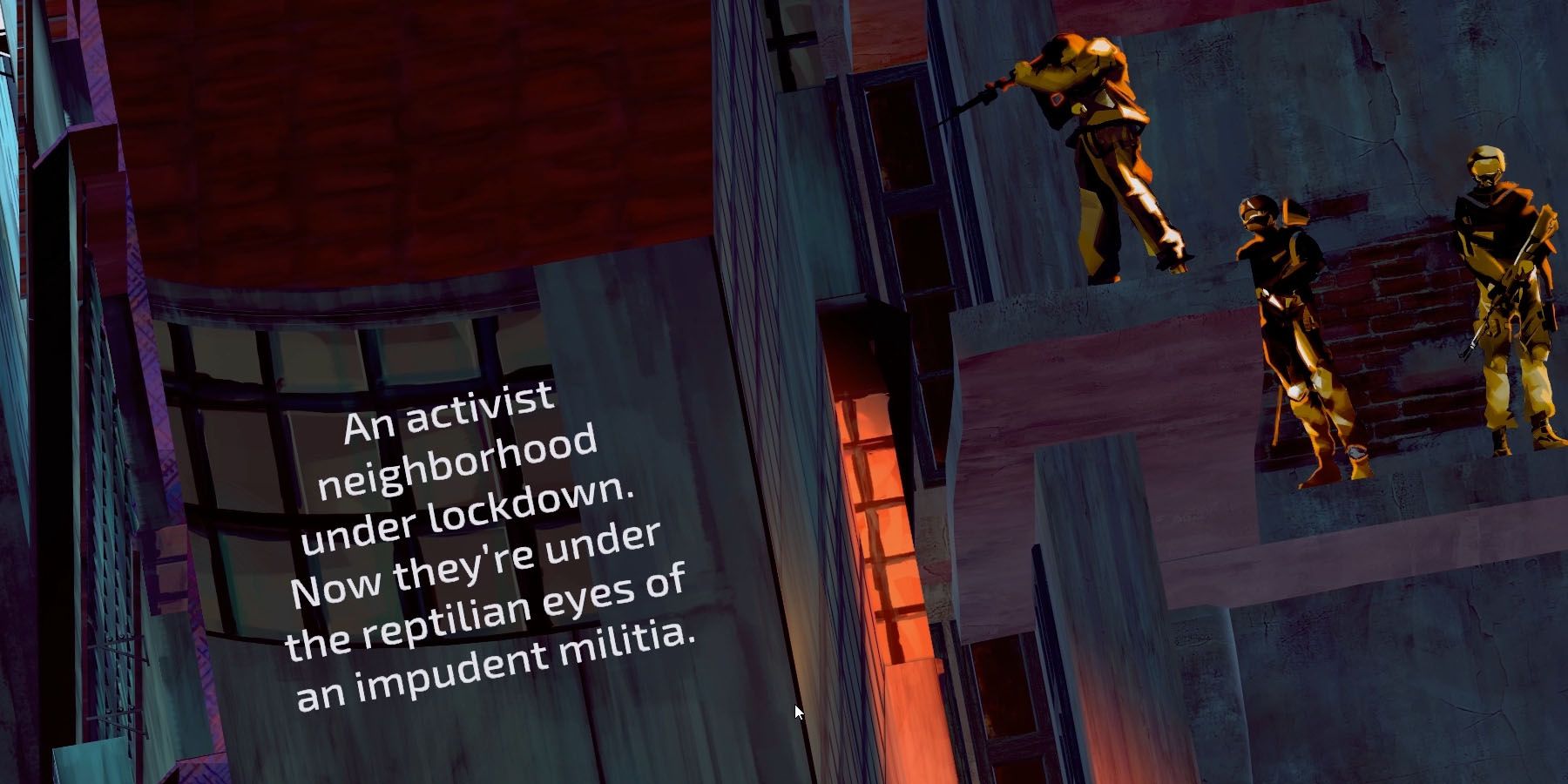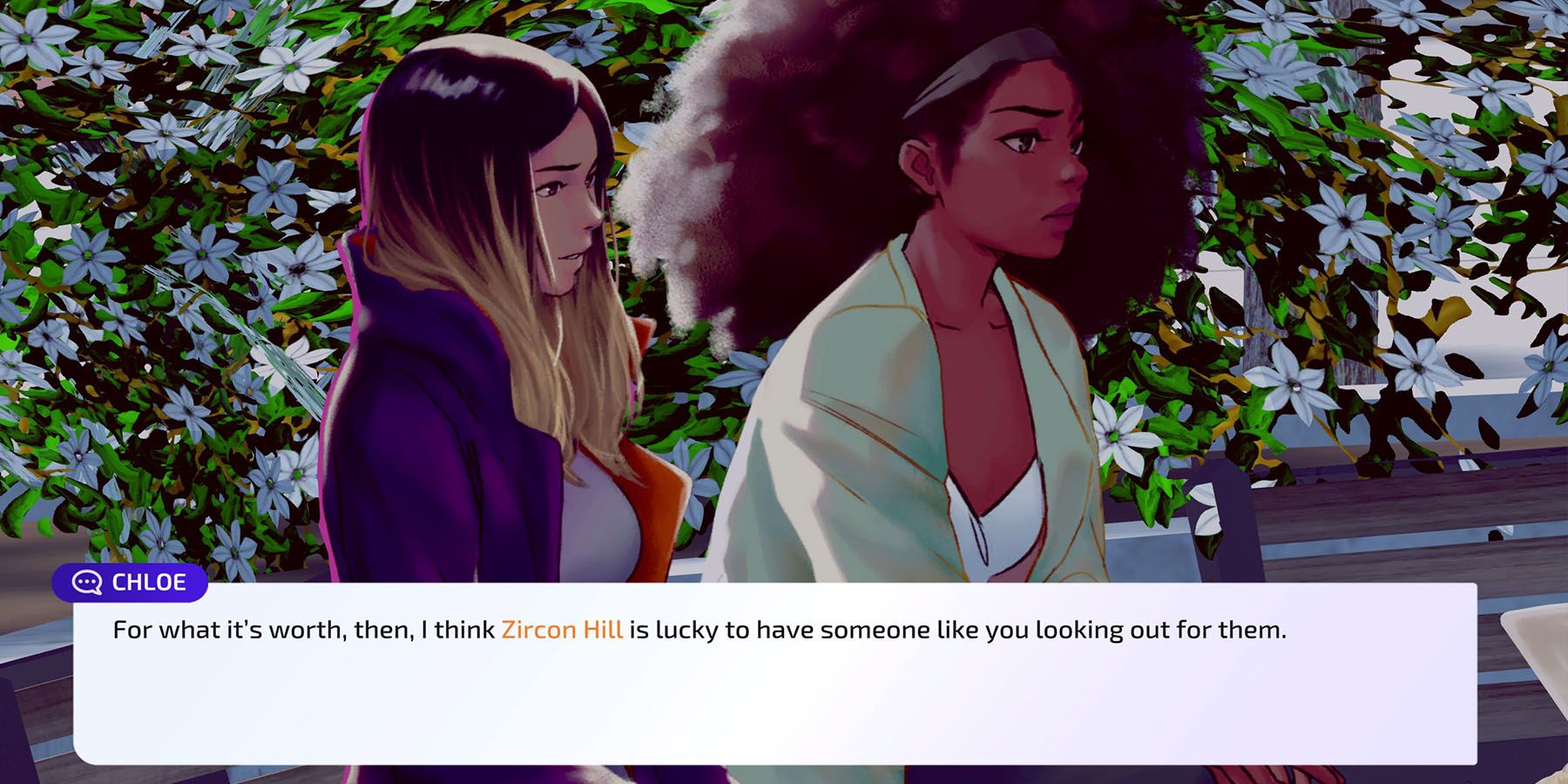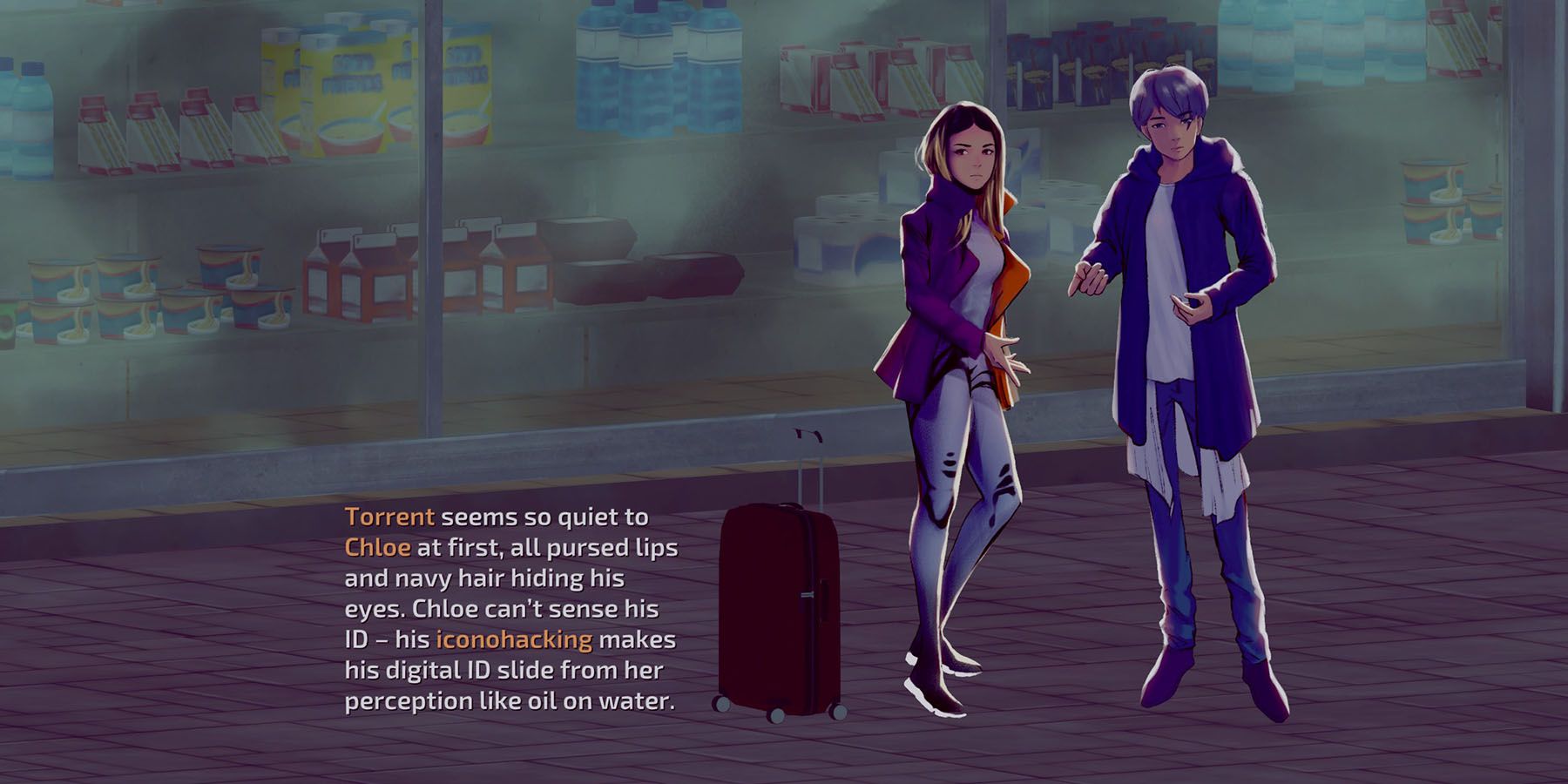How Solace State ‘Puts the Punk Back’ in Cyberpunk

[ad_1]
Highlights
- Solace State is a visual novel about resisting megacorps and finding love in a cyberpunk dystopia, inspired by the social concerns and causes of our time.
- The game explores themes of class struggles, social anxieties, and activism, drawing inspiration from real-life activists and their fight for rights.
- Solace State emphasizes friendship, inclusivity, and the empowerment of marginalized voices, while challenging traditional narratives and highlighting the punk element of cyberpunk storytelling.
Being a young adult in a cyberpunk dystopia presents a lot of challenges, as many of today’s youth are becoming all too aware. It’s that exact way that cyberpunk struggles increasingly mirror reality that inspired Solace State, a new visual novel about resisting megacorps, quantum iconohacking, and finding love in the neon lights of Abraxa City.
For Vivid Foundry, the developer of Solace State, it was important to trace back the cyberpunk genre to something deeper than its neon techwear aesthetic. Looking to 1980s American-Canadian author William Gibson, author of Johnny Mnemonic and Neuromancer, the Canadian studio brought the class struggles and social anxieties of the genre to the forefront in their coming-of-age story. Tanya Kan, director and executive producer of Solace State, spoke to Game Rant ahead of the game’s September 14 launch. The following interview has been edited for clarity and brevity.
Q: Can you introduce yourself for our readers?
A: My name is Tanya Kan. I’m the director and executive producer of Vivid Foundry, which focuses on story-driven games that reflect the social concerns and causes of our time. I am working on Solace State, a 3D visual novel about a young woman who comes to her own power and goes through her own journey, and gets to know her friends and her neighbors as she fights the biotech revolution.
Q: Where did the inspiration for Solace State come from?
A: So the inspiration came from so many different sources! I come from a political science background, and this is kind of the story behind getting into political science. It’s also partly because I’m really interested in knowing how people organize, both in terms of governance as well as in terms of on the streets, for causes. What would make someone really want to put their life on the line, to fight for their rights? So I did closely speak with activists around the world, to really understand where they’re coming from, what causes they believe in, how they activate a part of themselves to really drive and have that journey through of not just having that personal conviction, but making sure that this is a cause that they can strive for, and speak truth to power, and also really engage with individuals who might share similar concerns as them in order to fight for their rights.
A lot of that came from the sense of uncertainty also, and wanting to explore both that philosophically as well as in terms of what I think my place is in the world. What is bigger than me? So Solace State became that kind of coming-of-age journey, that really became the backbone of it. I knew right away I really wanted an exploratory game of someone who’s a little bit of a fish out of water. In Chloe, the main protagonist, and in exploring how she comes to understand the different neighborhoods, the gentrification in this world, but also like, what are the structures that cause it? And it’s not about necessarily blaming anyone, but really about looking at how people respond to threats yet also how people respond to hope.
At first, it came from a place of just heavy literature. Books on the table, my face on the desk, reading the books, and a lot of all-nighters in libraries and so forth. But then it became something much more visceral because I’m talking to real people on the front lines. That, of course, really changed over the course of the pandemic. I really had to explore how to tell the story in a hopeful way, and I think a lot of that came out of just talking to my team as well.
I feel like in some ways it’s weird because making games is kind of isolated compared to protest, so I don’t feel like I’m an activist at all, but I see them quite frequently. I’m in communication with them, folks in human rights, lawyers, and so forth. It’s kind of strange because I’m really on the sidelines.
Q: On the subject of your advocacy, Solace State wears advocacy on its sleeve. What message are you trying to convey?
A: I think it’s really that different people who fly under different banners, all related to harm reduction, to see a better world where there is more inclusivity can still come together and find some kind of friendship among each other. And that’s something that I have seen before, in folks who maybe focus on environmentalism and another group is focused on labor. They’re all very much focused on making sure that there are more diverse people who actually do get their voices heard. Not just their voices heard, but there is much more horizontal governance associated with how they can bring their voices to this table and also their policy ideas.
We’re trying to emphasize that element of friendship and also commitment to wanting to see a better world. There’s an element where we are looking at cyberpunk, but in a hopeful way, so that you can find friends in a world that doesn’t seem very friendly. You can find your own identity in terms of queerness as well. And of course, you’re surrounded by queer friends in this game. I think that in itself has been very much a personal journey of mine as well.
Q: On a personal level, it’s always nice to see female protagonists and queer influences in games.
A: Yes, exclamation mark, exclamation mark, exclamation mark! The fact is that there are so many queer women from protesters and people on the front lines, but they’re definitely the unpaid labor. I read a book that really did cover that. The book is Rebel Girls: Youth Activism and Social Change Across the Americas by Jessica K. Taft, and it really emphasizes youth activists who aren’t well-known.
They’re not named, a lot of the times they usually don’t get treated with as much dignity, and there is a lot of misogyny associated with it. I kind of wanted to paint a picture that was not that. I wanted to paint a better vision, a slightly fantastical one, of course, because there’s science fiction, but also it is like painting the world that you want to see. Yeah, there are so many career activists who don’t really get recognized, that queerness is actually part of their politics. They’re not written in the history books whatsoever.
Q: What makes cyberpunk the right genre for the story you’re trying to tell?
A: I think it’s really all about putting the punk back into action. Honestly, this is a kind of conversation that’s very strongly validated by my teammate Sunny Evans, who does technical narrative design. Once when we were on the livestream together, she mentioned “Yeah, we’re bringing punk back.” This is the real punk element of it. I often say, like, this isn’t just the neon lights. It’s not just the aesthetic, right? Sunny’s like, yeah, it’s not. Yeah, sure, we have tech wear, but that’s not the most important part of it.
The most important part of it is that punk is queer. It is about people on the fringes, and we’re really highlighting that. What we really think Solace State is going back to the roots, right? What is cyberpunk other than the use, overuse, and sometimes misuse of Asian cities that are extremely dense, high rises, right? What happens if we strip that away beyond just the aesthetic itself? What are we actually focusing on? And it’s really about people on the fringes who are trying to change the system.
Also, I forgot to mention, cyberpunk in a way is in the daytime now. It’s the dystopia that we’re experiencing, I think, for marginalized people. The joy of really working on a team where we have a lot of people of a minority gender is like cyberpunk. It’s what we experienced in a way, it’s in the daytime, it’s in our nine-to-five or nine-to-seven because we’re overworked. It’s not just during nighttime anymore.
Perhaps while I was still in high school, I might not have been realizing that things are political, that everything is actually political. I think even in university, and certainly years and years in the workforce, there are just some people who are just given different opportunities. And it could be economic. It could be anything. It helps us to understand that rather than just push it aside out of fear. I think that’s actually what really drives me forward in the creation of Solace State. It’s really recognizing that it’s better to stare into the systems that have been troubling us and find it wanting, and to just tackle it directly.
Q: That leads really well into my next question, which is, why do you think cyberpunk stories are so popular right now, especially in video games?
A: Ooh, that’s such a good question. Because we’ve been in development for so long, we started before you know, the big games were out like Cyberpunk 2077.
I think it has to do with how quickly technology is evolving, such that our legal systems haven’t caught up yet. That trickles all the way down to how we as a society look at our uncertainties. That’s a really academic response. I know. But I think there is something there. Technology is always being heralded as this savior. And I’m even, even in the wording of how I’m phrasing it, I’m almost like anthropomorphizing it right?
I think there is that sense of uncertainty, discontentment, and struggle with how we’re navigating these issues. I’m thinking about how quickly people’s minds can change, just because they’re discombobulated effectively with the amount of social media that we get. Solace State really reflects that, because we’re trying to make very uncanny camera placements in our storytelling. So I think cyberpunk has really been a way for us to navigate that discomfort. And also the friction that we come across, when we have a clash of really separate ideas, like a clash of ideologies more than anything else. People feel like they don’t really know who to turn to.
The aesthetic of that is also like, yeah, everything’s really dense right now. Literally the aesthetic approach of sky rises and so forth, everything’s a little dense. Maybe it’s a little cool to explore that. I think that’s where that comes from, as well. And the desire to be punk. I think there’s a lot to that as well.
Q: Given that you’ve got a very academic understanding of politics and are working in media, how are you navigating the space of being a very political developer in a media atmosphere where it’s common to decry politics in gaming?
A: Sometimes, I’m not on social media. I have to admit, like, there are times when I think who I am as a visible minority means that I actually got to chill a little bit, and not be on social media as much. Sometimes, I think I’ve really struggled with that because I feel like I’m less welcome in the space, right? There are times when I’m like, gosh, I can’t be on here right now. And I know like, if I was a different person, I could probably say whatever I want. And it doesn’t matter. I wouldn’t get loaded on social media.
I can understand how some people do see it as a privilege, though. I also definitely see it as a privilege to have gone to school for political science, for example. That has definitely shaped my understanding of the world in a different way. I’m able to really examine and critique systems, and that gives me a little bit of armor in some ways because there are just tools I can use to examine, like, using quantitative analysis to look at whether or not a policy is working, for example. I try to keep in mind that not everyone has had those experiences as me, and just really remind myself of that. I’m glad that my years of tuition are paying off. I think it’s that being graceful with that and feeling gratitude towards that.
It’s so interesting because I do feel like feel FOMO for sure. It’s like, should I have said something on the discourse du jour? And I hold back. I definitely do hold myself back, though. So yeah. It’s kind of playing the long game.
Q: Changing gears, what can you share about Abraxa City?
A: Abraxa’s got some very separate neighborhoods. We have Axial, which is the core of the city where all the biotech, high rises, and old government buildings are all centralized. We even have some media agencies there as well. Superstar agencies are all located there. And then you have other neighborhoods where the people really come to life for you, for Chloe.
You have Zircon Hill, which is unfortunately when you start the game, that’s where the whole neighborhood went under lockdown and is completely barred off. It’s completely controlled by armed guards. These armed guards are owned by the biotech company NEXIR.
Then, you have more mixed-income, middle-income neighborhoods like Fathom Piers, where first of all it’s on the pier. There are factories and shipping. There’s also quite a lot of permanent public housing as well, so you’ve definitely got a mix of different locations to explore. I’m not sharing absolutely everything yet, but how do these neighborhoods confront each other and how can the people work together or separately? That’s part of the game as well.
Q: And what about our protagonist Chloe?
A: Here’s a sneak peek I’ve never talked about before! You actually start off in a flashback scene. You’ll get to know her childhood and she’s working through a few things even at the beginning of the game. And you really get to examine her relationship with her best friend named Rebecka. She’s older than her. She’s her mentor, as well. At the end of Act 1.0.1, you actually wake up and you realize, “Hey, I’m looking for my missing friend, Rebecka. I’ve shared all of this history with her. She’s so important to me.” And then you enter Abraxa, because you’re really concerned for your missing best friend.
You’re speaking with your colleague, Hakim, who is a senior journalist. You find out that Chloe is working as a somewhat recent grad of two years, she’s working as a journalist, and she’s got the means. There’s a little bit of wish fulfillment there. She’s working as a journalist, and she is covering what’s happening in Abraxa. Abraxa has never seen a militarized lockdown of a neighborhood before, so this is unusual for the city.
While the auto taxi is driving you from the airport to the place of your residence, Hakim is telling you about what’s happening on the ground. The first choice comes up: do you tell Hakim that you’ve actually got a vested interest in taking on this role as a journalist in covering Abraxa because you have a missing friend here? Or don’t do that and just sass the living hell out of your senior journalist friend? So you come across the first choice there.
As the story progresses, you really do get a chance to see how Chloe has an avenue to her friends. Will she become an activist in her own right? How does this relate to her previous experiences in life? How does this relate to great intergenerational trauma? A lot of that really comes to the fore no matter who you end up dating. So you really do get a full coming-of-age journey with Chloe.
Q: Can you tell us about some of the other characters?
A: Hakim, he is a senior journalist and kind of gives you the framework in a way of what’s on the ground. Yeah, I won’t give too much away, but it’s clear that you have a very friendly rapport with him.
Of course, you have Rebecka, who is so much of how Chloe informs her morals. I think, in a way, she really learned to grow up into an adult with Rebecka by her side, but now they’ve been separated. There are so many intense feelings that Chloe has about this; like, first of all, they’re no longer connected together, always going to classes together, she feels that loss. And then there’s also that extreme loss of “I don’t know where she is, this is dangerous, I’ve never heard of anything like this happening in Abraxa before.”
Later on, you’ll meet Torrent, who actually is the person to help Chloe settle in at her apartment. This was shown in our earlier demos, and he’s very sweet. He’s a local to Abraxa. He’s lived here all his life. He is also a very talented hacker, so both Chloe and Torrent are very talented hackers. They share and revel in the enormity of how they are. They have an iconohacking ability, which is like being able to hack without any sort of interfaces, but using quantum mechanics and quantum tunneling instead. That’s our little bit of magical realism in the game. They’re very, very rare, one in several million people are iconohackers, and they’re more of a myth. And so they’re like, “Wow, we’re able to do this. That’s weird. All right, how can we use this ability to hack into Zircon Hill which is under lockdown?” That’s kind of how the game starts.
We also have Alden, who is Chloe’s ex, who’s also in the city. He is maybe working with some dubious folks, as well? And so, for Chloe, moralizing may or may not get in the way of that. What is their relationship going to be like? Are they going to butt heads against each other? So you’ve really got to engage with the old flame Alden, who’s also in the city.
Then you have Sueli, who is really the heart of activism in the game. She comes from experience, she’s been a community leader for a few years now in the game. She works with Hill Local, who helps individuals gain healthcare access in underserved communities effectively. And, of course, this means that she is stuffed under the Zircon Hill lockdown as well. That’s when you first come to meet her.
Those are really the main characters of the game. And of course, you’ll see some pretty stifling bad characters as well, along the way, who definitely want to further the system for their own gains.
Q: How does romance factor into Solace State?
A: So you already know about old flame Alden, and they were each other’s first loves. You’ll hear all about their fiery romance as well as their juicy breakup, depending on how you kind of choose to play the game, but you’ll still hear little inklings of it, here and there.
Now you also get to know Torrent who’s just such a sweet, soft boy, I think he’s the fan favorite because we show so much of him. He’s the shy boy, but one of the key aspects of writing Torrent for me was that he isn’t just the shy Asian boy. This can definitely pester some people in the at least East Asian community I’m familiar with, the stereotype of the Asian male character being the wallpaper for very good reasons culturally. Western media doesn’t do that justice. Torrent really takes a spin on that by emphasizing the way that he looks at relationships and why he doesn’t want to take the spotlight on many things. So his iconohacking powers attest to that as well. He’s more of a transportational or teleportation type of iconohacker, so he has to do a lot with movement. You really can get to know him from his familial perspective as well, so like not just towards himself, but how he relates to family. That’s really important to his arc. You will very early on meet his much more fiery older brother Mahlon who basically seems like he lives life by sassing others, and he’s an activist in his own right.
Which leads us to talking about Sueli. She is definitely a character who I knew I needed to introduce into the game three years ago but wasn’t actually part of the original cast. At first, she will take some time warming up to you because she’s so focused on her career. Making herself available to her community–that’s really always been at the forefront. But you’ll get some really juicy teasing elements as well with her, and she really wants to get to know you so if you want to spend time with her. There are going to be moments where you can definitely see the spark in her eyes and being like wow, you’ve got your politics in line. You’re cute. So that’s why I really, really enjoy Sueli’s flailing scenes as well. My co-writer, Ashley Cooper, really shaped a lot of the pacing of some of the conversations with Sueli. Ashley also gave her a very specific kind of humor, which I really adore. I kind of played with a little bit more of the juicy romantic scenes as well. I can’t wait. The launch trailer will show some very nice, spicy parts of that as well.
Not sure if I ended up talking about this in too much of a demisexual way; I’m just telling you about their characteristics more than like, how are you getting to know them? But yeah, you get some downtime scenes with them, and we’ll get some date opportunities.
Q: Is there anything else that you would like to add?
A: If you want a hope-filled game that also looks directly at some of the social concerns of our day, I think you’ll really enjoy Solace State. Sometimes, I think these games try to be reflective of their times. Hopefully, we will deliver on that. There’s definitely some humor scattered along the way because that’s what we need, I think, as activists. That’s what activists say as well. We often see activists making fun of tyranny and the tyrants, and I think the same is true here as well. There’s actually a lot of humor scattered throughout this game. It’s not all grimdark. We’re not a grimdark science fiction or cyberpunk game. You know, I wouldn’t throw an ex in there if that was the case. And there are some light-hearted moments. I think, like if you want a coming-of-age journey game, this is definitely for you.
[END]Solace State is available on Steam and Xbox Series X/S.
Source link



